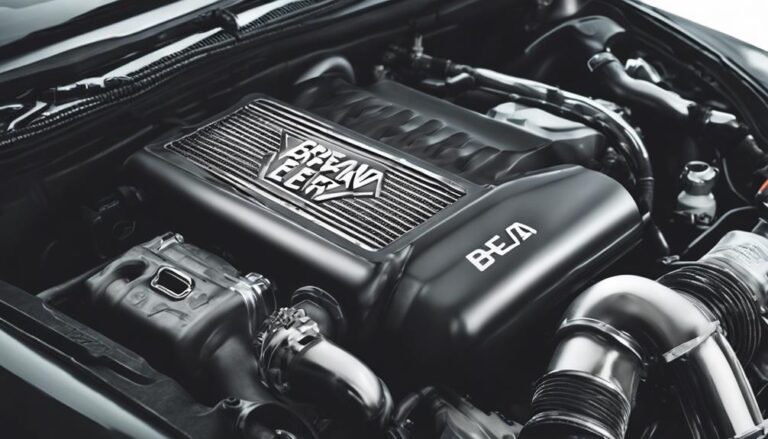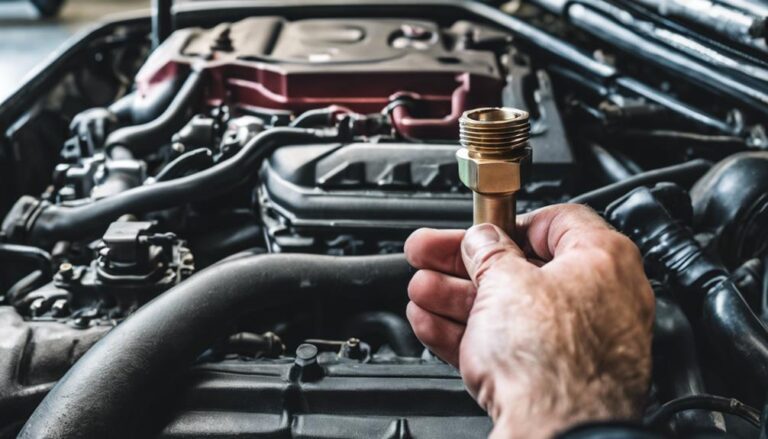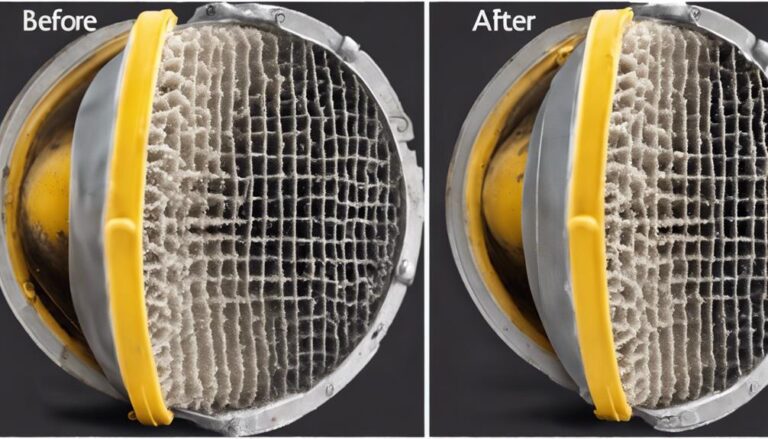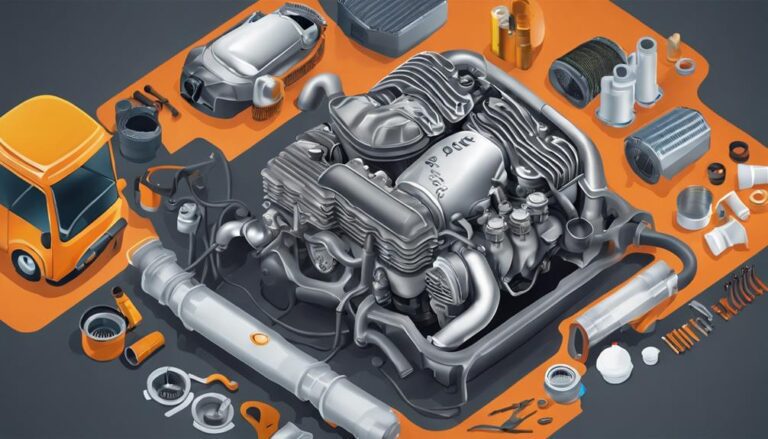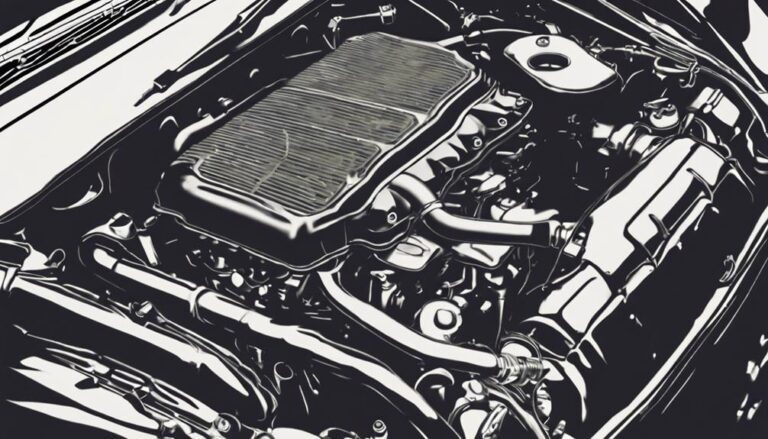10 Best Signs of a Bad Breather Filter
You may not be aware that a bad breather filter can have subtle yet significant effects on your vehicle's performance. If you've been noticing strange engine behaviors or a decrease in fuel efficiency, it might be time to assess the condition of your breather filter.
But did you know that there are more signs to look out for that could indicate a faulty filter? Stay tuned to uncover the full list of indicators that could point to a bad breather filter and learn how to address the issue effectively.
Key Takeaways
- Excessive oil consumption leads to decreased performance and engine damage.
- Odd engine sounds like sputtering indicate incomplete combustion and potential component damage.
- Decreased fuel efficiency results in higher costs and the need for regular maintenance.
- Engine stalling poses safety hazards, requiring immediate inspection by a qualified mechanic.
Excessive Oil Consumption
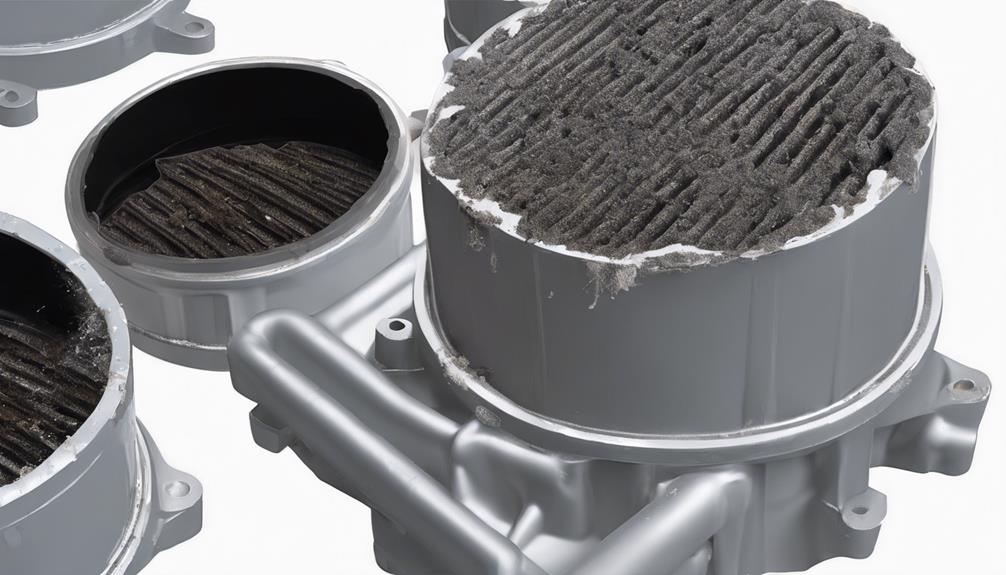
If you notice your vehicle consuming an unusually high amount of oil, it could be a sign of a bad breather filter. Excessive oil consumption can lead to several issues like oil leaks and decreased performance. A bad breather filter can cause oil to be sucked into the engine's intake, leading to increased oil consumption. This can result in oil leaks as the excess oil may not be burned efficiently during combustion.
To address this problem, regular maintenance of your breather filter is important. Make sure that the filter is clean and free from any clogs or blockages. Troubleshooting excessive oil consumption involves checking the breather filter for any signs of damage or wear. If the filter is compromised, it should be replaced promptly to prevent further issues.
Engine Misfires
If you notice odd engine sounds or experience decreased fuel efficiency, it could be a sign of engine misfires. Engine misfires occur when the air-fuel mixture in the combustion chamber fails to ignite properly, leading to a disruption in engine performance.
Ignoring engine misfires can lead to further damage and decreased engine efficiency over time.
Odd Engine Sounds
When your breather filter is faulty, you may notice odd engine sounds such as engine misfires. Engine misfires can cause abnormal sounds and affect your car's performance. These misfires occur when there is an incomplete combustion process in the engine. You might hear a sputtering or coughing noise coming from the engine, indicating a misfire. This issue can lead to engine vibration and a decrease in power while driving. If left unaddressed, engine misfires can cause damage to other components of your vehicle. It is essential to have your breather filter checked by a professional to prevent further complications.
| Signs of Engine Misfires | Effects |
|---|---|
| Sputtering noises | Engine vibration |
| Coughing sounds | Decreased power |
Decreased Fuel Efficiency
You may observe a noticeable drop in fuel efficiency when engine misfires occur due to a faulty breather filter. Engine misfires can lead to incomplete combustion, causing your vehicle to burn more fuel than necessary. This inefficiency can result in decreased miles per gallon and ultimately higher fuel costs for you.
To address this issue, consider checking and replacing your breather filter regularly as part of your vehicle's maintenance routine. A clean breather filter guarantees proper airflow to the engine, promoting efficient combustion and best fuel system performance. By staying proactive with maintenance tips like this, you can help prevent engine misfires, maintain good fuel efficiency, and save money in the long run.
Decreased Acceleration
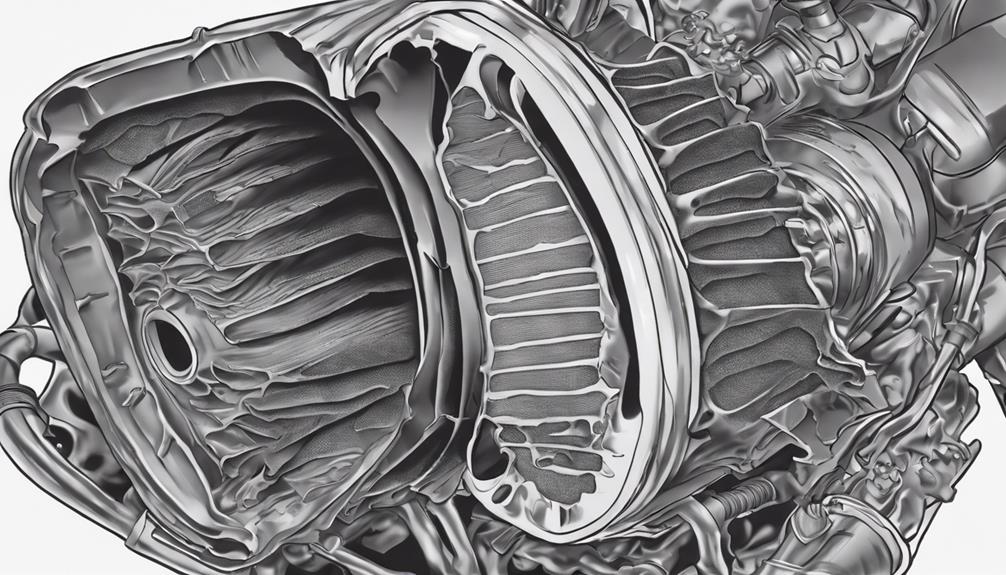
A noticeable decline in acceleration performance could indicate a potential issue with the breather filter in your vehicle. If you're experiencing acceleration loss or engine hesitation, it may be time to inspect your breather filter. The breather filter plays an important role in regulating air intake into the engine. When this filter gets clogged or dirty, it restricts the airflow, leading to a decrease in acceleration power.
When the breather filter isn't functioning at its best, it can disrupt the air-to-fuel ratio that the engine needs for efficient combustion. This imbalance can result in reduced acceleration capabilities and engine hesitation, causing your vehicle to struggle when you press the accelerator.
To address this problem, check your breather filter for any signs of dirt, debris, or clogs. If you notice any of these issues, it's recommended to replace the breather filter with a new one to restore proper airflow and improve acceleration performance. By maintaining a clean and functional breather filter, you can make sure smooth acceleration and overall engine efficiency.
Rough Idle
If you notice your engine idling roughly, it could be a sign of a bad breather filter.
Engine misfires, poor acceleration, and stalling issues are common symptoms of a clogged or faulty breather filter.
Addressing this issue promptly can help maintain your engine's performance and prevent further damage.
Engine Misfires
Experiencing engine misfires, commonly manifested as a rough idle, can indicate potential issues with your vehicle's breather filter. Ignition problems or spark plug issues may lead to misfires.
Ignition problems occur when there's a lack of spark, causing the air-fuel mixture not to ignite properly. This can result from worn-out spark plugs, faulty ignition coils, or a disrupted fuel supply.
Spark plug issues, on the other hand, can lead to incomplete combustion cycles, causing misfires and rough idling. Faulty spark plugs can prevent the spark from forming, disrupting the combustion process.
If you notice your engine running roughly or misfiring, it's important to address these issues promptly to prevent further damage and maintain optimal engine performance.
Poor Acceleration
Signs of a Bad Breather Filter can also be indicated by poor acceleration, which can lead to rough idling in your vehicle. When experiencing acceleration issues, it's vital to assess your breather filter.
Here are some maintenance tips to evaluate:
- Regular Filter Inspections: Check the breather filter for clogs or dirt accumulation.
- Airflow Assessment: Guarantee proper airflow through the filter to avoid performance issues.
- Contemplate Filter Upgrades: Improving performance may require upgrading to a higher quality breather filter.
Stalling Issues
Stalling issues, particularly rough idling, in a vehicle can often be attributed to a malfunctioning breather filter. When the breather filter becomes clogged or dirty, it can lead to airflow restriction, causing the engine to struggle at idle. This restriction disrupts the air-to-fuel ratio, resulting in poor combustion and erratic engine performance.
To address stalling problems, inspect the breather filter regularly and replace it if needed. Routine maintenance tips include checking the filter during oil changes and ensuring it's clean and free from debris. By taking these preventative measures, you can avoid stalling issues related to a faulty breather filter and maintain peak engine performance.
Poor Fuel Efficiency
If your breather filter is clogged or dirty, you may notice a decrease in fuel efficiency, leading to higher consumption rates and increased costs over time. Poor fuel efficiency can be a sign that your breather filter needs attention. Here are some key indicators to help you identify this issue:
- Decreased Mileage: A clogged breather filter can restrict airflow, causing your engine to work harder and burn more fuel to maintain performance.
- Reduced Power: As the breather filter becomes more blocked, your engine may experience a decrease in power, leading to inefficient fuel usage.
- Check Engine Light: A dirty breather filter can trigger your vehicle's check engine light, signaling a drop in fuel efficiency due to inadequate air intake.
To maintain prime fuel efficiency, make sure your breather filter is clean and free from debris. Regularly inspect and replace the filter as part of your vehicle's maintenance routine to keep your fuel system running efficiently.
Smoky Exhaust
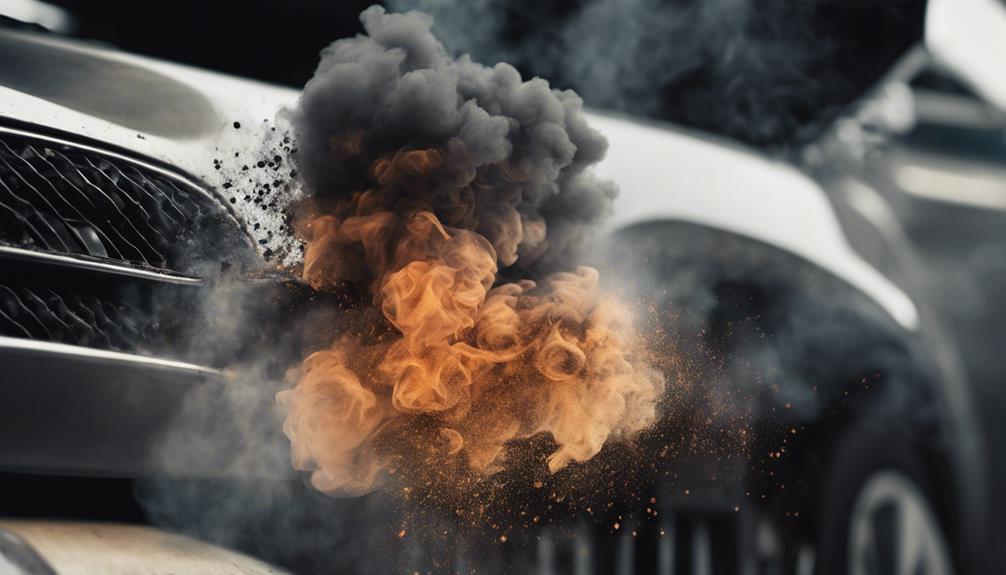
If you notice your vehicle emitting a smoky exhaust, it could indicate a problem with your breather filter.
This issue may result in a foul odor and decreased fuel efficiency.
Addressing this promptly can help maintain the performance and longevity of your engine.
Foul Odor
When you observe a foul odor resembling smoky exhaust emanating from your vehicle, it could indicate a malfunctioning breather filter. This problem can lead to a range of issues, impacting not just your vehicle's performance but also your overall driving experience.
Here are some key points to ponder:
- Unpleasant Smell: The foul odor is often the first noticeable sign of a problem with the breather filter.
- Decreased Air Quality: Inhaling these fumes can be harmful to your health and the environment.
- Potential Engine Damage: Neglecting the smoky exhaust smell may lead to more severe engine issues over time if left unchecked.
Regular maintenance of the breather filter can help prevent these issues and dispel common misconceptions surrounding vehicle odors.
Decreased Fuel Efficiency
Observing decreased fuel efficiency in the form of smoky exhaust signals potential issues with your vehicle's breather filter. When your breather filter is clogged or dirty, it can lead to a rich fuel mixture, causing incomplete combustion and the production of black smoke from the exhaust.
This not only impacts the environment but also your wallet due to increased fuel consumption. To address this, regular maintenance is key. Make sure to check and replace your breather filter according to the manufacturer's recommendations.
Ignoring this can result in further damage to your engine, leading to higher repair costs. By staying proactive with maintenance tips, such as replacing the breather filter, you can improve fuel efficiency and prevent costly repairs down the road.
Strong Odors in Cabin
Signs of a bad breather filter can manifest through strong odors in the cabin, indicating potential issues with air quality. When you detect unusual smells inside your vehicle, it could be a sign that your breather filter needs attention. Here are some reasons why strong odors in the cabin may point to a faulty breather filter:
- Mold or Mildew Growth: A clogged or dirty breather filter can lead to excess moisture buildup in the HVAC system, promoting mold and mildew growth.
- Contaminated Air: An old or malfunctioning breather filter may allow pollutants and harmful particles to enter the cabin, causing unpleasant odors.
- Exhaust Fumes: If the breather filter isn't functioning correctly, you might notice the smell of exhaust fumes inside the car, indicating a potential leak or issue with the filter.
To address strong odors in the cabin, it's essential to check and replace the breather filter as needed. Using air freshener solutions may temporarily mask the odors, but ensuring a healthy cabin air quality requires a properly functioning breather filter.
Engine Stalling
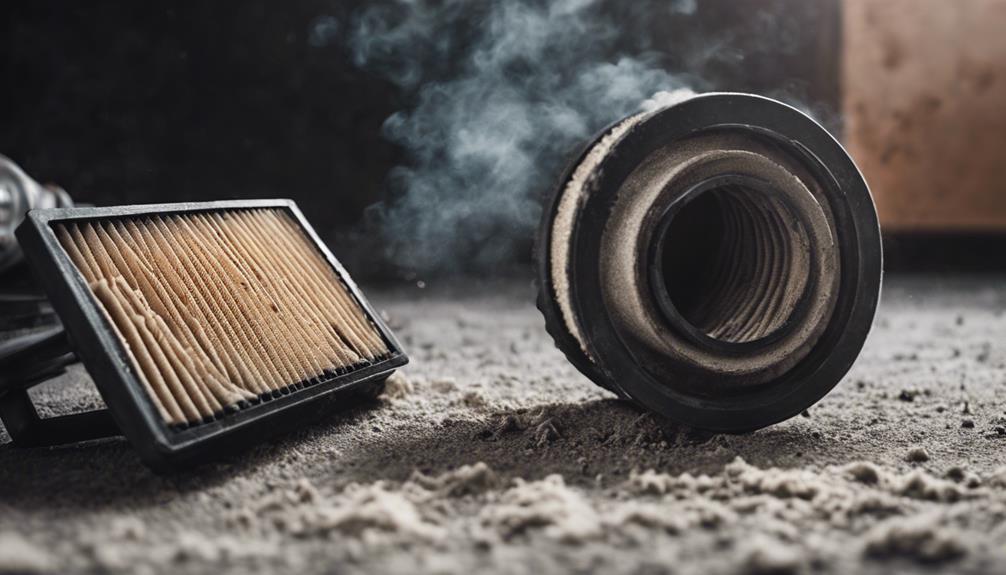
If you notice your vehicle experiencing sudden shutdowns while driving, it could be a potential indication of engine stalling. Engine stalling refers to the unexpected halting of the engine during operation, causing the vehicle to come to a stop. Several factors can lead to engine stalling, including issues with the ignition system and fuel injection.
In the case of a faulty ignition system, the engine may not receive the spark needed to ignite the air-fuel mixture, resulting in stalling. This can be caused by worn-out spark plugs, a malfunctioning ignition coil, or a problem with the spark plug wires.
On the other hand, issues with the fuel injection system, such as clogged fuel injectors or a failing fuel pump, can disrupt the proper fuel delivery to the engine, leading to stalling episodes.
If you experience frequent engine stalling, it's important to have your vehicle inspected by a qualified mechanic to diagnose and address the underlying problem promptly. Ignoring engine stalling issues can lead to further damage and safety hazards on the road.
Check Engine Light On
The illumination of the check engine light on your vehicle's dashboard indicates a potential issue that requires attention. When it comes to your vehicle's breather filter, this warning light could be a sign of a malfunction related to the filter's importance. Here's what you need to know:
- Breathalyzer accuracy: Just like a breathalyzer needs to be precise, your breather filter plays a vital role in maintaining the proper air-fuel mixture in your engine. A clogged or damaged filter can disrupt this balance, leading to issues that trigger the check engine light.
- Breath fresheners: Using breath fresheners may temporarily mask bad odors, but they don't address the root cause. Similarly, if your breather filter isn't functioning correctly, it can result in unpleasant smells or emissions that impact engine performance, prompting the check engine light to come on.
- Regular maintenance: Just as you seek routine dental check-ups for oral health, ensuring regular inspections and replacements of your breather filter can prevent issues that might trigger the check engine light, keeping your engine running smoothly.
Visible Wear on Filter

When examining your vehicle's breather filter, observing visible wear on the filter material can indicate potential issues affecting its functionality. Filter maintenance is essential to guarantee peak engine performance. Visible wear on the filter can lead to contaminants bypassing the filtration system and entering the engine, causing damage over time. It's vital to regularly inspect the breather filter for any signs of wear, such as holes, tears, or thinning of the filter material.
To maintain the efficiency of your breather filter, adhere to a strict replacement schedule as recommended by the manufacturer. Regularly changing the filter prevents excessive wear and tear, ensuring that it effectively captures dirt, debris, and other contaminants. By following the replacement schedule, you can prolong the lifespan of your breather filter and prevent potential engine issues.
Frequently Asked Questions
How Often Should I Replace My Breather Filter?
Replace your breather filter based on its lifespan, typically every 15,000-30,000 miles. Regular maintenance guarantees excellent engine performance and air quality. A clean filter prevents contaminants from entering the engine, promoting longevity and efficiency.
Can a Dirty Breather Filter Cause Damage to My Engine?
When breather filters are dirty, engine performance can suffer. Regular maintenance guarantees engine longevity. Neglecting filter care can lead to damage over time. Stay proactive to safeguard your engine and keep it running smoothly.
Are There Any Signs of a Bad Breather Filter That Are Easily Overlooked?
Regular breather filter maintenance is important for your engine's health. Troubleshooting signs of a bad breather filter can prevent damage. Overlooking these issues can lead to costly repairs. Inspect and replace filters to guarantee top performance.
Is It Possible for a Breather Filter to Become Clogged Even if It Looks Clean?
Even if it appears clean, a breather filter can still get clogged due to hidden contaminants. This can lead to decreased efficiency and potential damage. Avoid maintenance misconceptions by regularly inspecting and replacing filters as needed.
Are There Any DIY Methods for Cleaning or Maintaining a Breather Filter?
To keep your breather filter in top shape, DIY cleaning methods like using compressed air or washing with a mild detergent can help. Preventive maintenance includes regular inspections and replacement to guarantee peak engine performance.
Conclusion
To sum up, a bad breather filter is like a clogged artery in the body of your vehicle, hindering its performance and efficiency.
Just like how a healthy heart is important for the body to function properly, a clean and functioning breather filter is essential for your engine to run smoothly.
Keep an eye out for the signs mentioned above to make sure that your vehicle breathes easy and performs at its best.


